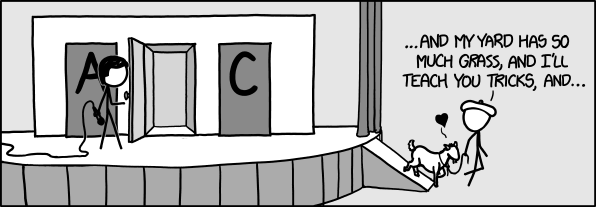Monty hall problem extended.
Solution 1:
I decided to make an answer out of my comment, just for the heck of it.
$n$ doors, $k$ revealed
Suppose we have $n$ doors, with a car behind $1$ of them. The probability of choosing the door with the car behind it on your first pick, is $\frac{1}{n}$.
Monty then opens $k$ doors, where $0\leq k\leq n-2$ (he has to leave your original door and at least one other door closed).
The probability of picking the car if you choose a different door, is the chance of not having picked the car in the first place, which is $\frac{n-1}{n}$, times the probability of picking it now, which is $\frac{1}{n-k-1}$. This gives us a total probability of $$ \frac{n-1}{n}\cdot \frac{1}{n-k-1} = \frac{1}{n} \cdot \frac{n-1}{n-k-1} \geq \frac{1}{n} $$
No doors revealed
If Monty opens no doors, $k = 0$ and that reduces to $\frac{1}{n}$, which means your odds remain the same.
At least one door revealed
For all $k > 0$, $\frac{n-1}{n-k-1} > 1$ and so the probabilty of picking the car on your second guess is greater than $\frac{1}{n}$.
Maximum number of doors revealed
If $k$ is at its maximum value of $n-2$, the probability of picking a car after switching becomes $$\frac{1}{n}\cdot \frac{n-1}{n-(n-2)-1} = \frac{1}{n}\cdot \frac{n-1}{1} = \frac{n-1}{n}$$
For $n=3$, this is the solution to the original Monty Hall problem.
Switch.
Solution 2:
By not switching, you win a car if and only if you chose correctly initially. This happens with probability $\frac{1}{4}$. If you switch, you win a car if and only if you chose incorrectly initially, and then of the remaining two doors, you choose correctly. This happens with probability $\frac{3}{4}\times\frac{1}{2}=\frac{3}{8}$. So if you choose to switch, you are more likely to win a car than if you do not switch.
You never told me whether you'd prefer to win a car or a goat though, so I can't tell you what to do.

Solution 3:
Let's reason in the case of $n$ windows and just $1$ car.
When Monty gives you the opportunity to modify your initial choice, it is definitely better to take it. Here's a way to see it:
The probability of finding the car with the first choice is just $\frac{1}{n}$, and this is the same probability that you have of winning if you keep your initial choice.
Of course you will win by changing your choice if the intersection of two events will happen:
You didn't choose the car with the first choice ( $P(A) = \frac{n-1}{n}$ )
You are lucky and you find the car with your second choice ( $P(B\mid A) = \frac{1}{n-2}$ )
So the probability of winning by changing your mind is the product $$ P(A\cap B) = P(A)\cdot P( B\mid A ) = \frac{n-1}{n}\cdot \frac{1}{n-2} = \frac{n-1}{n(n-2)} > \frac{1}{n} $$ Since $ \frac{n-1}{n-2} \to 1 $ when $n\to \infty$, we notice that Monty's help is not that useful in the case of many many windows.